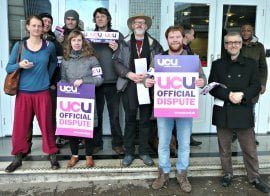The first of three two-hour short, sharp strikes took place today, Thursday 23rd January, from 11am to 1pm. The picketing in Coventry was the most successful since this current dispute began back in the autumn term 2013. Darrall Cozens of the West Midlands UCU reports from the picket lines and looks ahead to future rounds of planned actions.
The mood on the picket line in Coventry said it all. Enthusiasm and confidence building. The first of three two-hour short, sharp strikes took place today, Thursday 23rd January, from 11am to 1pm. The picketing was the most successful since this current dispute began back in the autumn term 2013.
Some 35 UCU members and supporters at Coventry University set up three separate picket lines, giving out hundreds of leaflets to staff, but mainly to students. The leaflet contained three essential points: teaching staff in HE have suffered a 13% fall in real wages since 2009; universities have a combined surplus of more than £1bn, with many more billions in reserves, so they have money to pay up; Vice-Chancellors (VCs) have had huge pay rises over the past year, yet deny a decent pay rise to university staff.
University employers have offered a 1% rise when prices are increasing by between 2-3%, depending on CPI or RPI figures. Yet according to the UCU website, over the past year average pay rises for VCs have been 5.1% with a quarter of them, 40 out of 142, getting more than 10%. Graig Culhoun of LSE got a rise of 61.1%, Keith Burnett of the University of Sheffield got 39% more, and Michael Driscoll of Middlesex picked up 25% more. The VC at Coventry University, John Latham, got a rise of 17.9% to take his salary from £218,000 to £257,000. In addition, there are perks such as enhanced pension contributions.
It is figures like these that have incensed staff, both teaching and support. That is why today’s action was the first of three, with another two-hour strike on Tuesday 28th January, from 2-4pm, and then again on Monday 10th February, from 9 to 11am. The aim of the these short strikes is to have the maximum impact with the minimum cost to staff. Some classes were abandoned half way through and on returning at 1pm some classes began after the allotted time.
It was obvious that this tactic was having an effect, as on the way to the picket I came across hundreds of students making their way to the city centre along the lane between the old and new cathedrals. If I had not known there was a strike, it could have looked like an evacuation due to a fire drill.
In general, the two-hour strike was well supported around the country, with larger picket lines than on previous occasions. However, as is to be expected, the picture is uneven, depending on the historical size of the branches and the role of leadership. For most places this action will enthuse and regenerate the morale of UCU members. In future action, it is vital that student union leaders connect with striking unions in order to give students a better understanding of the issues involved, which will aid student solidarity in support of the strikes.
The positive mood seen on the picket lines in Coventry and elsewhere must be built on. Two-hour strikes in higher education, involving only the UCU, are limited in what they can achieve. The task is for all the unions in higher education to take action together, supported by a walkout of the students. In this respect, the student union leadership – particularly at a national level with the NUS – should be linking up with the education unions to organise joint action.
Ultimately, this struggle must be linked with the struggles in all other areas of society. The leaders of the labour movement should be organising for a one-day general strike to give confidence to workers in fighting against this Tory-led Coalition and their programme of austerity.
UCU members on the picket lines will return to work full of infectious enthusiasm, ready to talk to other colleagues, both UCU members and not unionised, to convince them to come out next Tuesday. Contact is also to be made with the student unions on the campus to try and arrange a joint open meeting between the student union and the UCU.
This dispute will not be won by industrial action alone. The cuts in public spending are part of a concerted drive to reduce the share of wealth that workers produce going back to workers. The figures produced by Oxfam in the lead up to the World Economic Forum in Davos highlight the obscene division of wealth, where those at the top of society have amassed great fortunes. The richest 85 people on the planet have a combined wealth of $1.7trn which is equal to the combined wealth of 50% of humanity, 3.5bn people.
Only when we own and control the wealth that we produce can we put an end to austerity and the cuts. However, that requires a political solution that UCU members have to think about. For now, build on the success of today, build the membership base, build the UCU and fight to defend our terms, conditions and standard of living.






